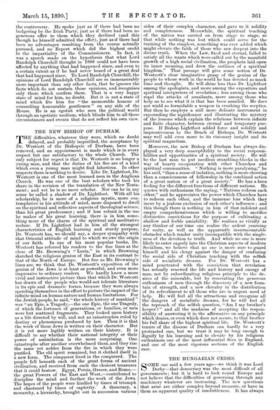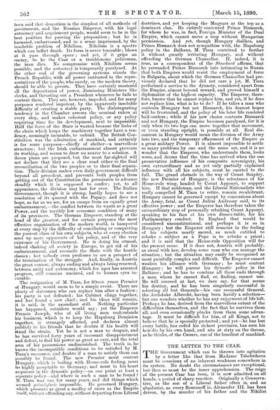nit HUNGARIAN CRISIS.
SOME one said a few years ago—we think it was Lord Derby—that democracy was the most difficult of all governments ; but it is hard to look round Europe and not believe that the difficulties of governing through any machinery whatever are increasing. The new questions that arise are either complex beyond measure, or have in them an apparent quality of insolubleness. It has always been said that despotism is the simplest of all methods of government, and the Russian Emperor, with his legal autocracy and acquiescent people, would seem to be in the best position for proving the proposition ; but he is harassed, embarrassed, and in a sense imprisoned, by the insoluble problem of Nihilism. Nihilism is a spectre which can inflict death. Its form is never traceable ; blows at it pass through space ; and yet, if it grips an enemy, be he the Czar or a troublesome policeman, the man dies. No compromise with Nihilism seems possible, and the autocracy is temporarily paralysed. At the other end of the governing systems stands the French Republic, with all power entrusted to the repre- sentatives of the people, who surely, on the modern theory, should be able to govern. They have certainly mastered all the depositaries of power, dismissing Ministers like clerks, and thrusting out a President whenever he fails to content them. They are, however, impeded, and for many purposes rendered impotent, by the apparently insoluble difficulty of creating a stable party. The disintegrating tendency in the Chamber arrests the nominal rulers at every step, and makes coherent policy, or any policy requiring time for its development, next to impossible. Half the force of the State is wasted because the links of the chain which keeps the machinery together have a ten- dency, seemingly incurable, to unbind. The British Con- stitution was the admiration of mankind, and certainly is for some purposes—chiefly of shelter—a marvellous structure; but the Irish embarrassment almost prevents its working, and seems to draw no nearer to a solution. A dozen plans are proposed, but the most far-sighted will not declare that they see a clear road either to the final reconciliation of the two peoples or to their final separa- tion. Their division makes even daily government difficult beyond all precedent, and prevents both peoples from getting out of the Constitution the permission to advance steadily which it is supposed to confer; yet, to all appearance, the division may last for ever. The Italian Government, though it is strong, hardly hopes to see a resolution of its quarrel with the Papacy, and does not hope, so far as we see, for an escape from an equally great embarrassment,—the conflict between its wants as a great Power, and the terribly low economic condition of many of its provinces. The German Emperor, standing at the head of the greatest, and for certain purposes the most effective organisation of the modern world, is hampered at every step by the difficulty of conciliating or conquering the poorest class of his own subjects, who at every election send up more opponents of his policy, and of the very existence of his Government. He is doing his utmost, indeed shaking all society in Europe, to get rid of his embarrassment, and reconcile the State with the hostile classes ; but nobody even professes to see a prospect of the termination of the struggle. And, finally, in Austria the great contest, always ending and always being renewed, between unity and autonomy, which for ages has arrested progress, still remains uncured, and to human eyes in- curable.
The resignation of M. Tisza, for fifteen years Premier of Hungary, would seem to be a simple event. There are plenty of statesmen who can replace him after a fashion ; his party is not defeated; his Cabinet clings together, and has found a new chief ; and his ideas will remain, it is said, in the ascendant still. Nothing particular has happened, outsiders would say ; yet the Emperor Francis Joseph, who of all living men understands his business, which is to keep the Hapsburg Dominion together, is strangely affected, and declares almost publicly to his friends that he doubts if his health will stand the strain. Yet he is not a man to despair, and he has survived forty years of incessant disappointment and defeat, to find his power as great as ever, and the total area of his possessions undiminished. The truth is, he knows the incompatible conditions to be satisfied by M. Tisza's successor, and doubts if a man to satisfy them can possibly be found. The new Premier must content Hungary, which is boiling with Home-rule feeling, must be highly acceptable to Germany, and must in his heart acquiesce in the dynastic policy—on one point at least a separate policy—and where is such a man to be found ? M. Tisza was one for many years, and did things which seemed prima facieimpossible. He governed Hungary, which presents as great a medley of races as the Empire itself, without offending any, without departing from Liberal doctrines, and yet keeping the Magyars at the top as a dominant clan. He entirely contented Prince Bismarck, for whom he was, in fact, Foreign Minister of the Dual Empire, which cannot move a step without Hungarian permission. And yet, though Hungary dislikes, and Prince Bismarck does not sympathise with, the Hapsburg policy in the Balkans, M. Tisza contrived to further it without greatly irritating Hungary, and without offending the German Chancellor. If, indeed, it is true, as a correspondent of the Standard affirms, that he persuaded Prince Bismarck into intimating to Russia that both Empires would resist the employment of force in Bulgaria, about which the German Chancellor had pre- viously declared that he did not care a jot, M. Tisza performed a service to the dynasty, considered apart from the Empire, almost beyond reward, and proved himself a diplomatist of the highest capacity. The Emperor, there- fore, knows that he cannot replace him, and yet, if he does not replace him, what is he to do ? If he takes a man who contents Hungary but not Bismarck, his dearest hopes will be frustrated, and the policy of his later life rendered half-useless ; while if his new choice contents Bismarck and not Hungary, the Empire becomes paralysed, for it is only when its two legs can move together that movement, or even standing upright, is possible at all. Real dis- content in Hungary would mean the division of the Army into two, and the temporary effacement of the Empire as a great military Power. It is almost impossible to settle so many problems by one and the same act, and it is no wonder that the Emperor, who understands them, looks worn, and deems that the time has arrived when the one preservative influence of his composite sovereignty, his own extraordinary and as yet only partially explained influence with all his subjects, must be exerted to the full. The grand obstacle in the way of Count Szapary, the new Premier of Hungary, is the reluctance of his Home-rule wing, headed by Count Apponyi, to support him. If that nobleman, and the Liberal Nationalists who really compelled M. Tisza to retire, remain recalcitrant, Hungary cannot be governed except by concessions about the Army, fatal, as Count Julius Andrassy said, to its effective power ; and the Emperor has therefore taken the extraordinary step of personally rebuking Count Apponyi, speaking to his face at his own dinner-table, for his Parliamentary conduct. In England that would be considered unconstitutional, and perhaps it is so in Hungary ; but the Emperor still remains in the feeling of his subjects nearly sacred, as much entitled to rebuke a subject as a Pope is to rebuke a priest ; and it is said that the Home-rule Opposition will for the present cease. If it does not, Austria will probably, as usual with her, develop some man who can manage the situation ; but the situation may easily be recognised as most painfully complex and difficult. The Emperor cannot weaken his alliance with Germany ; he must content Hungary ; he will pursue his dynastic policy in the Balkans ; and he has to combine all these ends through a man whom he cannot find, or, finding, cannot use. He will succeed at last, we dare say, for that seems his destiny, and he has been singularly successful in selecting all but Generals—his one successful General, the Archduke Albrecht, having been hardly a selection— but one wonders whether he has any enjoyment of life left. Perhaps he has, derived from the marvellous extent of the difficulties themselves, and the fact that he survives them all, and even occasionally plucks from them some advan- tage. It must be difficult for him, of all Kings, not to believe that he is specially protected ; and yet—he has lost every battle, has ceded his richest provinces, has seen his heir die by his own hand, and sits at sixty on the throne, as he thinks, of the Cresars, one of the loneliest of mankind.







































 Previous page
Previous page